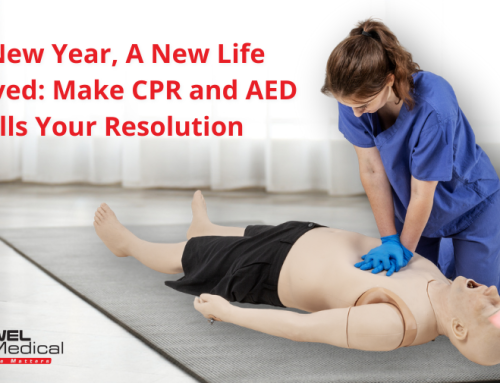[vc_row][vc_column][vc_column_text]The winter months bring with them cold weather that can play havoc with the heart health of even the healthiest of people. That can be even more problematic if you have an existing or unknown-about heart condition, or live a lifestyle that puts you more at risk of heart attack or cardiac arrest.
With that in mind, in this blog post, we’re looking at how to keep your heart healthy in the cold weather.
What happens to your heart when you are cold?
When the ambient temperature gets colder, your body adjusts to keep pumping blood around your body at the rate and pressure that’s needed. In the cold, your blood vessels narrow, your heart pumps faster, your blood pressure goes up, and your heart essentially works harder than in a more comfortable temperature. Cold weather can also cause your blood to thicken. This can lead to clotting that increases the risks of heart attacks and strokes.
Who is most at risk of heart problems during the winter?
While not an exhaustive list, you should take extra care to stay warm during the cold weather if you:
- Are an older person or are immunocompromised (have a weaker immune system)
- Are a child – especially a smaller one
- Have a lung condition like asthma and COPD
- Have been diagnosed with heart disease
- Survived a heart attack
- Previously experienced a cardiac arrest – especially if it happened recently
Ways to keep your body warm over winter
[/vc_column_text][vc_empty_space][vc_single_image image=”2523″ img_size=”full”][vc_empty_space][/vc_column][/vc_row][vc_row][vc_column][vc_column_text]The British Heart Foundation recommends seven ways to keep your heart warm over winter. They are:
- Staying at home with the heating turned up on days when it’s bitingly cold, and wearing extra layers of clothes if needed
- Getting active indoors to increase your core temperature and help boost your immune system. (They even have a page suggesting seven indoor exercises you can try!)
- Eating hot food and drinking hot drinks that hydrate you and give your body the energy it needs. (When it comes to your heart, soups, teas and spiced apple = good! Mulled wine and warm brandy = bad!)
- Wrapping up warm when you head outside, particularly wearing lots of thinner layers rather than one thicker layer
- For those with angina, wearing a scarf loosely around your mouth and nose. Or alternatively, wear a face mask when outdoors
- Making your home more energy efficient in order to keep as much warmth inside as possible while keeping pennies in your pocket to heat your home down the line too
- If you start to feel ill with a cold or flu, making sure to rest, drinking lots of fluids and getting advice from your GP or pharmacist about over the counter remedies that are suitable for you (especially if you’re also taking prescribed medication).
The link between cold weather and cardiac arrest
When considering ways to keep your body warm over winter, you may find it encouraging to know that scientists are currently working on a way to predict which days you should take extra care.
In May 2021, the British Heart Foundation published this page discussing newfound links between cold weather and instances of cardiac arrests.
The links were found in a study conducted in Japan and published in the scientific journal Heart, which took cardiac arrest data and looked at it alongside weather data for several preceding years. The results showed that:
- Lower temperatures are associated with more cases of sudden cardiac arrests (SCAs)
- The more the temperature drops within one day (or in comparison to the day before), the more cases of SCAs there were.
The researchers conducting the study posited that it therefore might be beneficial to combine their data into a computer model that could then be cross-referenced with weather forecasts.[/vc_column_text][vc_empty_space height=”16px”][vc_single_image image=”2524″ img_size=”full”][vc_empty_space height=”16px”][vc_column_text]However, the British Heart Foundation, while not dismissing the study, urged people to focus on what they can control during the colder season.
“Rather than think about the weather and the day of the week, the most important thing for any of us to focus on is managing our underlying risk of heart and circulatory disease by having a healthy, balanced diet and getting enough physical activity,” said Chloe Arthur, BHF Senior Cardiac Nurse.
“If you are concerned about your risk of heart disease, you can discuss this with your GP. You may be eligible for an NHS Health Check, which will help you understand your overall risk of heart and circulatory disease.”
Are you prepared for the worst this winter?
At WEL Medical, we believe that nothing beats looking after your heart health as best you can, while also being prepared should the worst happen.
And when it comes to the increased risk of cardiac arrests in winter, being prepared means having a defibrillator nearby should anyone experience a sudden cardiac arrest for any reason.
Whether you run a business, work in a local council office, volunteer in a high footfall area, or feel your neighbourhood could benefit from having lifesaving equipment on hand, here at WEL Medical we offer some of the most advanced and easy-to-use defibrillators available anywhere in the UK.
To learn more, check out the blogs below or get in touch with us to talk through your needs.[/vc_column_text][vc_empty_space][/vc_column][/vc_row][vc_row][vc_column][vc_column_text]
Related articles
- Choosing the Right Defibrillator
- World Heart Day: Heart Attack or Cardiac Arrest?
- World First Aid Day: CPR Guidance in a Covid-19 World
- What Happens When You Use A Defibrillator?
- Places You Wouldn’t Think Need a Defib (But Really Do!)
[/vc_column_text][/vc_column][/vc_row]





